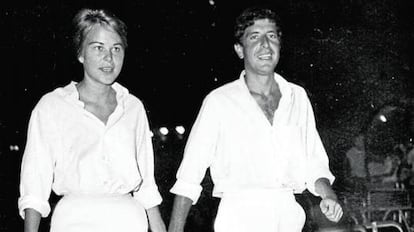Little Axel: The sad story of the boy who grew up with Leonard Cohen
A new documentary about the son of Marianne Ihlen, the Canadian singer/songwriter’s girlfriend and muse, portrays a man who has spent most of his life in psychiatric care since his bohemian youth

For the past few years, Axel Joachim Jensen has lived in a small, wooden house with a porch, where he likes to go out for a smoke, and a window with a view of meadows and pine forests. The house is part of a psychiatric facility near Oslo (Norway), in a tranquil location where bird songs and chirps are the only sounds to be heard. Jensen lives there voluntarily.
The 63-year-old Jensen has been in and out of various mental health facilities since he turned 19. His mother was Marianne Ihlen, who was one of singer/songwriter Leonard Cohen’s great loves and muses. Jensen tells the story of growing up with Cohen in the documentary film, Little Axel, directed by Fabien Greenberg and Bård Kjøge Rønning. “It can be a bit difficult to remember the things you just want to forget… but now I live in a nice place,” he says in the film.
The documentary was filmed shortly before the outbreak of the pandemic and could only be released in Norway and the US, but plans are now underway for a broader, international distribution. One autumn morning, around the time of the film’s pre-pandemic premiere, Jensen agreed to take a car trip with me and his legal guardian to Larkollen, the coastal village in southeastern Norway where his mother was born.
Jensen was serious for most of the trip and said little, perhaps because of his medication. Little escapes his stony, piercing gaze, but his face occasionally lights up with a tender and childlike delight. A heavy-set man, he shaves his head and wears a scraggly, gray beard. He walks briskly around the town once we arrive, but once we are sitting at a bar, he seems indifferent to our conversation, his mind in some other place. “Cohen had a dark side,” he blurts out suddenly. “But I miss being with him.” He says little else. Behind his rough demeanor, I catch glimpses of a stunted sensibility, scattered thoughts, and a lifetime of inner pain.
His father was Axel Jensen, sometimes called the Jack Kerouac of Scandinavian literature. His other father – Leonard Cohen. Two prominent figures of the counterculture who set out to light the world on fire through literature and poetry. Nonconformists, tormented, narcissistic, mystical, thirsty for adventure and lust – the creative process was the only thing that gave meaning to their lives.
Little Axel, as he was nicknamed, arrived on the Greek island of Hydra with his parents when he was only four months old. A few days later, his father left Marianne for another woman. Marianne soon met Cohen, another artist living in the island’s bohemian, expatriate community, and so began one of the most romanticized relationships of recent times. Leonard and Marianne, doomed to failure from the beginning but immortalized in song – So Long, Marianne. It was a turbulent relationship, full of ups and downs, that lasted eight years. Cohen assumed the role of Axel’s stepfather, providing financial and emotional support to the child. Long after his breakup with Marianne, Cohen continued to help Jensen, sometimes taking him into his home.

Little Axel is the story of a life told through harsh, personal testimonies backed by melancholic guitar chords and punctuated with old photos, mostly taken in Hydra. Jensen grew up in a small colony of expatriates that disdained conventional mores and pursued an Arcadian dream of idyllic innocence tarnished by human flaws. Axel tells how he grew up in complete freedom, smoking and getting drunk at the age of seven. When he was nine, he traveled over 160 miles (260 km) across the seas to the southern Greek island of Crete accompanied only by his 12-year-old friend, Jeffery Brown. “They [our mothers] loved us, but they also loved their own freedom. We had to be adults at an early age,” said Brown. At 15, Jensen was smoking hashish and had tried LSD. The next year, he traveled alone to India, returning from the trip depressed and aggressive. Jensen moved to California to be with Cohen two years later when he was 18. It was the last time they would see each other – his 19th birthday was spent in a mental institution.
When he was seven, Jensen was dispatched to Summerhill, a British boarding school and bastion of anti-authoritarian education, and later to a strict, Swiss boarding school. His tender and desperate letters home to his mother and Cohen are heart-wrenching. Little Axel seems to lay most of the blame at Marianne Ihlen’s feet in this sad tale of neglect, lost souls, and festering wounds. Curiously, the film does not allude to a genetic predisposition as a potential cause of Jensen’s mental illness, even though his paternal grandmother had been committed to a mental institution, according to Torgrim Eggen, who authored a biography of Jensen’s father. In Axel, Eggen writes about frequent, aggressive outbursts by Jensen’s father who was once treated by David Cooper, the father of anti-psychiatry, and administered LSD in their first session. “You could say he was borderline [mentally ill],” writes Eggen.
“Hydra certainly took its toll on many of the foreign children who lived there, because of their unstructured, unfettered lives,” notes Helle V. Goldman, editor of When We Were Almost Young
(Tipota Press), an anthology of short memoirs about the island, where she also grew up. The children were witnesses to the lives led by the adults – to their infidelities, their parties, and their alcohol and drug use. Some say that Ihlen was too focused on her own life adventure, but Goldman believes that it’s all too easy to blame the young and lonely mother.
Leonard, Marianne, and Me (Backbeat Books), Judy Scott’s insightful and honest memoir about her days in Hydra during the sexual revolution of the drug-fueled 1970s, tells an anecdote about taking mescaline with young Axel who starts hallucinating that he can see Cohen’s ghost. Scott remembers Ihlen as a careless but devoted mother who ultimately blamed herself for her son’s suffering.
In August 1970, shortly before Cohen famously succeeded in calming a rowdy audience at a music festival on the Isle of Wight (UK), he received a letter from a patient at Henderson Hospital, a psychiatric facility near London, inviting him to give a concert there. “I hope you like So Long, Marianne,” said Cohen as soon as he walked in. For the next two hours, Cohen played for about 50 young patients at the facility, and told them about his fading relationship with his muse, about how he took 300 acid trips to write the song You Know Who I Am, how he wrote One of Us Cannot Be Wrong in a shabby hotel room while he tried to kick an amphetamine habit, and about the crushing loneliness he sometime felt.
That was the first of a series of concerts play by Cohen in various mental health facilities to wildly appreciative audiences. “When you are committed to a mental institution, voluntarily or not, you are admitting to a tremendous defeat. You’ve made a choice,” he would later say. “And I felt that my songs had elements of that choice, of that defeat, that these audiences would empathize with.”
Axel Jensen has started playing chess again, as he used to do with Leonard Cohen during those carefree days on Hydra – and still listens to his songs.
Tu suscripción se está usando en otro dispositivo
¿Quieres añadir otro usuario a tu suscripción?
Si continúas leyendo en este dispositivo, no se podrá leer en el otro.
FlechaTu suscripción se está usando en otro dispositivo y solo puedes acceder a EL PAÍS desde un dispositivo a la vez.
Si quieres compartir tu cuenta, cambia tu suscripción a la modalidad Premium, así podrás añadir otro usuario. Cada uno accederá con su propia cuenta de email, lo que os permitirá personalizar vuestra experiencia en EL PAÍS.
¿Tienes una suscripción de empresa? Accede aquí para contratar más cuentas.
En el caso de no saber quién está usando tu cuenta, te recomendamos cambiar tu contraseña aquí.
Si decides continuar compartiendo tu cuenta, este mensaje se mostrará en tu dispositivo y en el de la otra persona que está usando tu cuenta de forma indefinida, afectando a tu experiencia de lectura. Puedes consultar aquí los términos y condiciones de la suscripción digital.









































